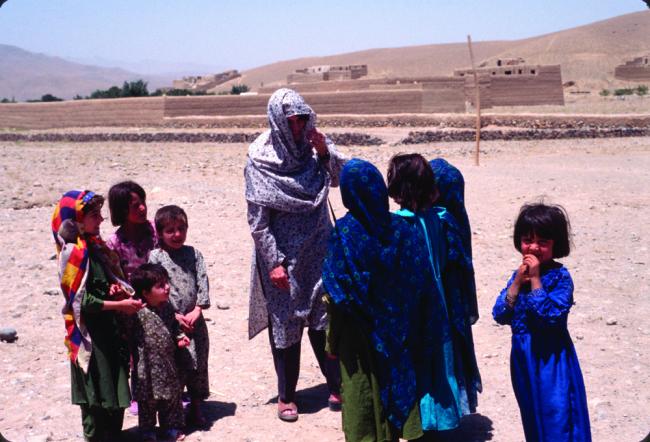At Large In Ballard: On the rise
Dr. Suzanne Griffin with school children in front of a makeshift school in Afghanistan--July, 2002-- where she is helping to rebuild after many years of oppression under the Taliban. Dr. Griffin has been working since 2002 to establish schools.
Wed, 03/05/2014
By Peggy Sturdivant
Suzanne Griffin was traveling by horseback on her way to a remote clinic in the Bamyian Province of Afghanistan. She and her local counterparts had left their Russian-made Jeep stuck in mud. It may have been as the horses managed to scale the muddy bluff that she knew in her bones she would not be returning to her position as a Dean of Instruction at South Seattle Community College at the end of her sabbatical.
At an age when some people retire Dr. Griffin remains committed to helping Afghanistan rebuild after the Taliban and three decades of war. Since 2002 she has been establishing schools for girls through international organizations and working with their Ministry of Education to provide resources that will allow the country to better help itself.
When Griffin first made her request for sabbatical there were faculty attributed her request to grief. He husband had died unexpectedly of a heart attack in 1999. They had met and married while he was in the Peace Corps, and been stationed in Afghanistan and Iran. As parents of young daughters they had been in Iran, and evacuated after the Embassy takeover. With their children grown the couple had planned to return to Afghanistan.
After September 11th, Griffin realized she wanted to return on her own. The South Seattle Community College Chancellor approved Griffin’s sabbatical request. “I don’t think you’re crazy, “ he told her privately, “but keep your head down.”
How did one of four girls born to a pair of teachers become a woman who travels the world and works in war zones? Her mother was a kindergarten teacher who lamented upon knowing that her daughters were marching again U.S. involvement in Viet Nam, “I don’t want my children to suffer.” Her father was a teacher and football coach, who was later a dean and provost at University of San Francisco.
Griffin completed her Ph.D. in Education at University of Washington while she and her husband raised two daughters and worked in the public sector. This coming spring one sister will complete her Ph.D. at the age of 65, even as another sister and nephew receive their undergraduate degrees.
Now it is Dr. Griffin’s daughters who might worry knowing their mother is often at the front lines of still volatile Afghanistan, a country where education itself was banned for decades. Since 2002 Dr. Griffin has spent the better part of each year in Afghanistan doing curriculum development, English language projects, and training principals and teachers in every aspect of education.
As much as she loves her family and grandchildren in Seattle and Tacoma, Dr. Griffin could be the most qualified person in the world to train, oversee and evaluate programs in Afghanistan. Her background is in non-verbal and multi-sensory learning. She speaks their language (Dari), as well as Farsi (one of the landlocked country’s borders is Iran). With her dark hair and brown eyes she also has the ability to “pass” as a native in a country where women are just now learning to drive.
On March 22nd at 4 p.m. Dr. Suzanne Griffin will read from her new memoir, “Lessons of Love in Afghanistan,” share excerpts from the documentary “Girl Rising” and share images taken by international photographer Peter Bussion. Her talk is co-sponsored by Ayni Education International and will be held at Pacific Crest School, 600 NW Bright Street. Ayni is an organization that supports education in Afghanistan; Dr. Griffin is a Board member.
The memoir was born out of letters that she continued to write to her husband after his death, as well as stories from the Peace Corps days that needed to be captured. Those were in the days long before cell phones and in locations too remote for radio.
When she first completed a draft of “Lessons of Love in Afghanistan,” the editor at Bennett & Hastings Publishing asked her, “Are you writing about you and your husband or the Afghan culture?”
The two had become so intertwined in her life story, and her passion for the country is so great. She had to work to find a way to shape those letters and notes into a narrative that would do justice to both. Not all that Griffin has witnessed could be included in the memoir. Her work helping medical professionals led her to work in a field hospital, “The IEDs weren’t as bad watching people die needlessly.” That her toughest year, “didn’t fit the theme.”
The memoir was written in part for her children and her friends so they can better understand why she is compelled to do what she does, in a time zone 12.5 hours different from ours. She hopes that the memoir’s message will also reach the broader audience that never hears about citizens of Afghanistan who want to be educated, and who want their children to be educated. “No one is writing about the middle class. These are the people who are quietly pulling the country up again.”
Widow, grandmother, educator, Dr. Suzanne Griffin can pass as an “auntie” in Kabul. However the women there look to her as an exemplar of a woman with power, in a country where women have been brutally repressed. In Seattle Dr. Griffin may pass for a another soft-spoken, dark-haired woman but she is an inspiration here as well, a woman fearless in the quest of doing what makes her happiest; helping others to rise.
Dr. Griffin’s talk will be at Pacific Crest School, 600 NW Bright Street on Saturday, March 22, 2014 from 4-6 p.m. The event is free with a suggested donation. Copies of her book will be available. Additional information available through www.bennetthastings.com


